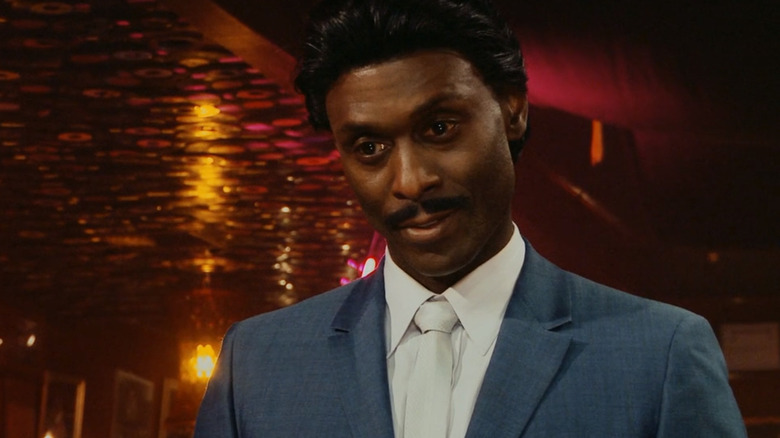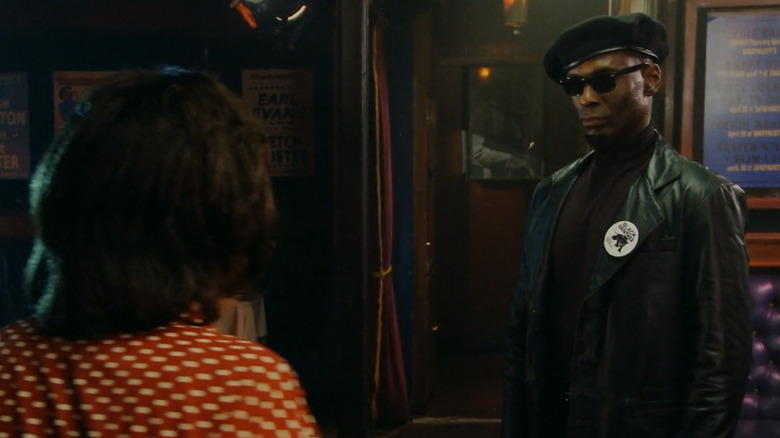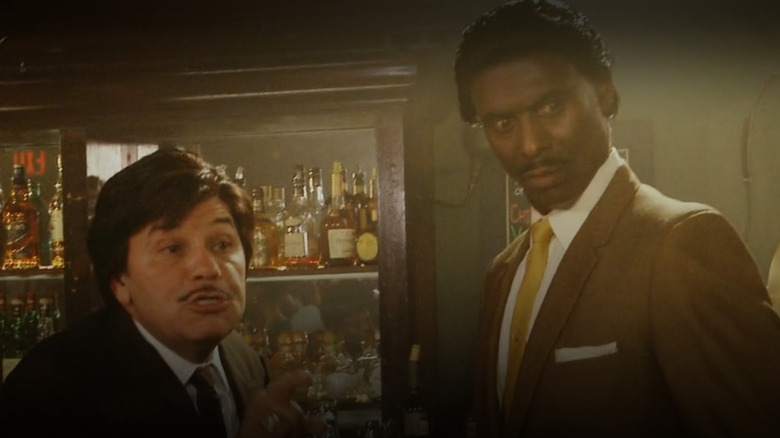Lance Reddick Was The Best Part Of The Worst Episode Of It's Always Sunny
"It's Always Sunny in Philadelphia" fans are pretty die-hard, and love even the most unlovable episodes, but one that tends to come up again and again when debating the worst episode is "Frank's Brother," from season 7.
The episode is almost entirely told via flashbacks and voiceover from Frank (Danny DeVito) and his brother Gino (Jon Polito), and their view of the past is pretty prejudiced and based in stereotypes, but one character they encounter is a real standout. Serious dramatic actor Lance Reddick, who starred in everything ranging from "The Wire" to the "John Wick" films, appears as Reggie, the owner of a Black jazz club in the 1960s that hires both Frank and Gino. Lance Reddick is one of those actors who shows up and immediately improves whatever he's been cast in, and in the case of "Frank's Brother," he turns the whole thing from a slightly cringey pastiche of 1960s and '70s crime cinema into a genuinely funny riff on certain kinds of Black characters from the period.
I absolutely love "It's Always Sunny in Philadelphia" and there are parts of "Frank's Brother" that kind of work, but Reddick as the menacing, mustachioed Reggie held it all together. Reddick gets to play Reggie as an angry Blaxploitation-style club owner who calls his women his b****es, a Civil Rights radical, and a member of the Nation of Islam, going from one stereotype to another but playing them both with typical Reddick fierceness. "Frank's Brother" might be kind of a mess, but Reddick (and Reggie) are fantastic.
Exposing his funny bone
In "Frank's Brother," Frank and Gino end up warring over a singer named Shadynasty (Naturi Naughton) because they both fall in love with her. The thing is that Reggie is also in love with Shadynasty (pronounced shah-die-nusty, if you're curious), but he keeps getting arrested as a result of all of the shenanigans happening in their club. Gino and Frank, meanwhile, are free men because they're white and aren't targeted by the police. They make a joke about "hey, it's the '60s" but, as the end of the episode shows, that kind of discrimination is still alive today. Reggie, for his part, is a strong and powerful man with a bad temper who ends up finding something to keep him going with the Black Power movement, even though he ends up separated from Shadynasty once more.
Reddick's portrayal of the character is pitch-perfect, because the entire story is being told through Frank and Gino's eyes. The gang on "It's Always Sunny" tend to view the world through pop culture-tinted glasses, and their memories of the 1960s and '70s being so stereotypical and movie-like is pretty on-brand for them. Reddick leans into it, giving a performance that's both intense and absolutely hilarious. He manages to encompass numerous stereotypes and tropes in a single character, but plays it with such sincerity that the comedy of it actually works.
Playing silly completely straight
One of the best things about "It's Always Sunny in Philadelphia" is seeing normal people interact with the gang. Even when they're the memories of normal folks, they're still going to be shocked by the antics of the Paddy's Pub crew. Because the gang are so darn ridiculous, there are only a few other characters in their orbit that can be as ridiculous or the comedy won't work; every good jokester needs a straight man to play off of. Reddick's Reggie is one of the best to ever endure the nonsense of the gang — or at least of its patriarch, Frank. Seeing the traditionally dramatic actor let loose and get weird with it is truly a shot of sheer joy in an otherwise muddled episode, and it's a shame we didn't get to see Reddick show off his comedy skills more often.
Sadly, the actor has died at the age of 60, taking all of his incredible talents and presence with him. Reddick may be remembered for many of his more serious roles, but there will always be a special place in my heart for Reggie. "Frank's Brother" may be one of the worst "It's Always Sunny" episodes, but Reggie is one of the greats.


